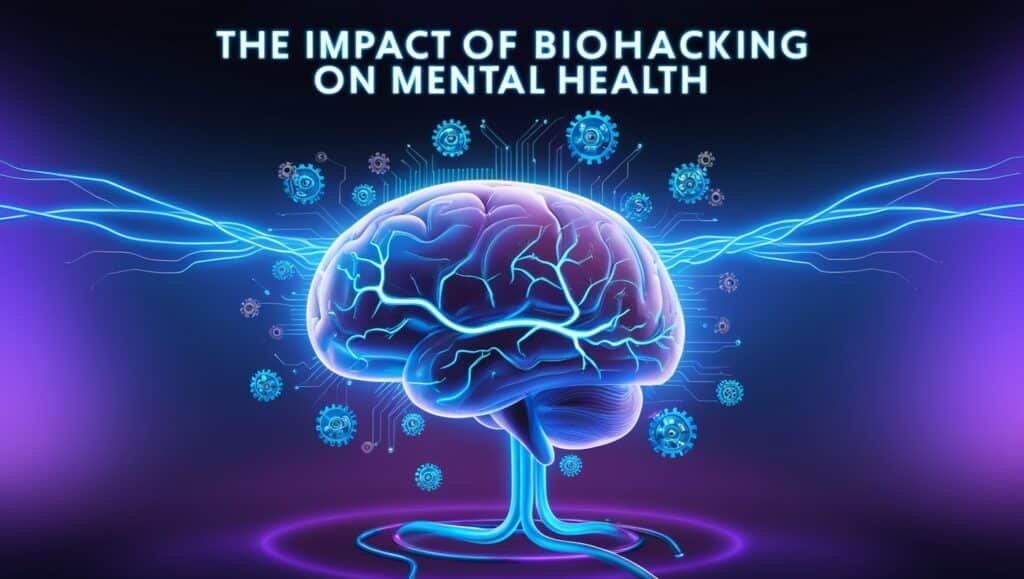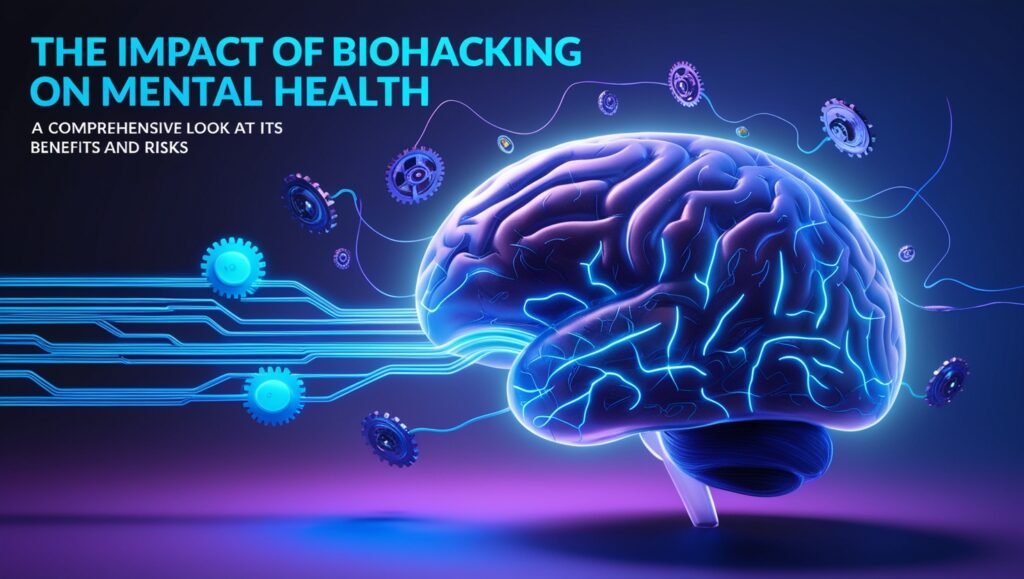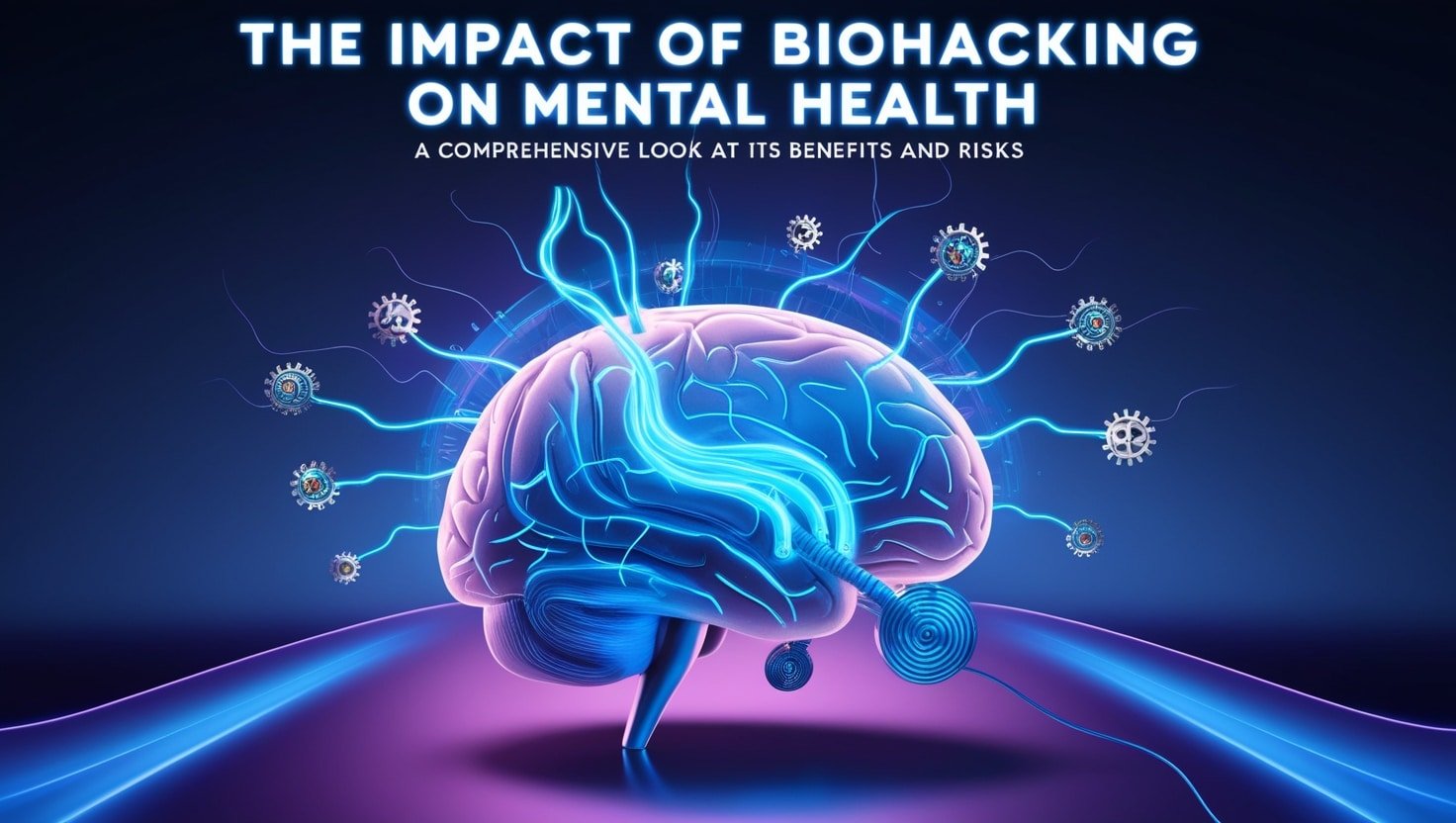Biohacking has become a widely discussed topic in recent years, especially among individuals seeking to optimize their physical and mental health. From using nootropics to advanced technologies like brainwave stimulation, biohacking promises to enhance cognitive function, emotional stability, and overall mental well-being. As a medical professional, I have closely observed the rise of biohacking and its effects on mental health. In this article, we’ll delve into how biohacking affects mental health, the potential benefits, and the associated risks.
What is Biohacking and How Does It Relate to Mental Health?
Biohacking is often defined as the use of science, technology, and self-experimentation to optimize the body and mind. Many people engage in biohacking practices to improve physical performance, increase energy, and enhance mental clarity. These practices often involve changes in diet, exercise, sleep habits, and even technology-based interventions such as wearables and brain stimulation devices. As the field grows, biohacking has expanded to include mental health optimization, where individuals use various methods to enhance their cognitive abilities and emotional stability.
While biohacking for physical health—like intermittent fasting, exercise routines, and nootropics—is well documented, biohacking for mental health is still a relatively new area of study. Researchers and practitioners are increasingly exploring how biohacking can improve mental health by addressing conditions such as anxiety, depression, stress, and cognitive decline.
The Role of Nootropics in Enhancing Mental Health
One of the most popular biohacking practices for mental health improvement is the use of nootropics. Nootropics, often referred to as “smart drugs,” are substances that claim to enhance cognitive function, including memory, focus, and mental clarity. Some individuals use nootropics to combat stress, boost productivity, and prevent cognitive decline as they age.
There are several different types of nootropics, including natural compounds like caffeine, ginseng, and omega-3 fatty acids, as well as synthetic substances such as modafinil or racetams. Research suggests that certain nootropics may offer cognitive benefits. For instance, caffeine has been shown to enhance alertness and improve memory. Omega-3 fatty acids, commonly found in fish oils, are believed to support brain health by reducing inflammation and improving cognitive function.
However, it’s important to note that the long-term effects of many nootropics are still not fully understood. As a medical professional, I recommend approaching nootropic use cautiously and consulting with a healthcare provider before beginning any supplement regimen. For more information about nootropic substances and their effects on brain health, you can explore credible resources like the National Institute on Aging.
Sleep Optimization and Mental Health: A Biohacker’s Approach
Another important aspect of biohacking that impacts mental health is sleep optimization. Sleep is essential for mental well-being, and biohackers have long been interested in improving the quality and duration of sleep. Techniques like tracking sleep cycles using wearables, adjusting light exposure, and practicing relaxation techniques have been shown to improve sleep and, in turn, support mental health.
Studies have demonstrated that poor sleep is linked to numerous mental health disorders, including anxiety, depression, and cognitive decline. Biohackers who focus on optimizing sleep often use wearable devices like the Oura ring or Fitbit to track their sleep patterns. By collecting data on sleep stages, heart rate variability, and movement during sleep, biohackers can make data-driven adjustments to improve their rest.
Some individuals also turn to light therapy, which uses exposure to specific wavelengths of light to regulate circadian rhythms. This practice has been shown to improve mood and reduce symptoms of depression, especially during the winter months when sunlight exposure is limited. You can learn more about the importance of sleep and its impact on mental health from trusted resources such as the Sleep Foundation.
Meditation and Mindfulness in Biohacking Mental Health

Biohacking isn’t limited to supplements or technology—it also includes mental practices like meditation and mindfulness. These techniques are proven to reduce stress, improve focus, and enhance emotional resilience. Biohackers often incorporate mindfulness into their daily routines to optimize their mental health. Whether it’s through guided meditation apps like Headspace or techniques like the Wim Hof Method, biohackers are constantly exploring ways to boost their mental well-being through mindful practices.
Mindfulness and meditation have been shown to reduce the levels of cortisol, the stress hormone, in the body. Chronic stress is linked to several mental health conditions, including anxiety and depression. By lowering cortisol levels, meditation and mindfulness can have a significant impact on improving mood and mental clarity. A study published in JAMA Internal Medicine found that mindfulness meditation can help reduce symptoms of anxiety, depression, and pain.
Neurostimulation: Biohacking the Brain for Mental Clarity
For biohackers interested in advanced techniques, neurostimulation is a fascinating area of exploration. This involves using electrical impulses or magnetic fields to influence brain activity. Techniques such as transcranial direct current stimulation (tDCS) or transcranial magnetic stimulation (TMS) are becoming more accessible for home use. These technologies are designed to stimulate specific areas of the brain to enhance cognitive function, reduce symptoms of depression, and improve overall mental health.
While some studies have shown promising results, the long-term effects of neurostimulation on mental health remain unclear. As a healthcare professional, I caution individuals against using these devices without professional guidance. While these methods have shown potential in treating conditions like depression and ADHD, improper use could lead to unintended side effects. For more details on the safety and efficacy of neurostimulation, you can visit the National Institute of Mental Health’s page on treatments for depression.
Risks of Biohacking for Mental Health
Despite the potential benefits, biohacking comes with its risks, especially when it comes to mental health. Many biohacking practices, such as the use of nootropics or neurostimulation, have not been extensively studied, and their long-term effects on the brain remain unknown. Improper use of these methods could lead to psychological side effects, including anxiety, irritability, or cognitive dysfunction.
Furthermore, relying too heavily on biohacking can lead to a “quick fix” mentality. Mental health is complex, and no single biohacking technique is a substitute for a balanced lifestyle, including regular exercise, proper nutrition, social support, and therapy. As a doctor, I stress that biohacking should be viewed as a complement to traditional mental health care, not a replacement.
Biohacking also carries the risk of over-experimentation, where individuals may make frequent, drastic changes to their routines without fully understanding the consequences. Self-experimentation can be dangerous if it’s not done with proper knowledge and professional guidance.
Biohacking for Mental Health: A Balanced Approach
In conclusion, biohacking offers exciting possibilities for improving mental health. From nootropics to sleep optimization, meditation, and neurostimulation, there are many innovative ways to boost cognitive function and emotional well-being. However, it’s crucial to approach biohacking with caution and to consult with healthcare providers before trying new techniques or substances.
I recommend taking a balanced approach to biohacking: incorporate safe, proven methods such as exercise, proper nutrition, mindfulness, and adequate sleep, while exploring newer techniques in a responsible, well-researched manner. By combining these practices with traditional mental health care, biohacking can be a valuable tool in your mental wellness journey.
For more information on mental health optimization techniques and their scientific basis, I encourage you to explore authoritative resources like the National Institutes of Health (NIH) or the American Psychological Association (APA), which offer evidence-based insights on mental health.
How Diet and Nutrition Play a Role in Biohacking Mental Health
In the realm of biohacking, diet and nutrition are essential components for enhancing mental health. Biohackers often turn to specific dietary practices to optimize brain function and emotional well-being. A balanced diet, rich in essential nutrients, can provide the foundation for both cognitive and emotional health. Nutritional biohacking emphasizes the importance of certain foods and supplements that support brain health and mood regulation.
The Ketogenic Diet: A Popular Biohacking Strategy for Mental Clarity
One of the most popular dietary approaches among biohackers is the ketogenic (keto) diet. The keto diet involves high-fat, moderate-protein, and very low-carbohydrate intake, which forces the body to burn fat for fuel rather than carbohydrates. This state, called ketosis, produces ketones, which are used by the brain as an alternative energy source.
Research suggests that the ketogenic diet may have benefits for mental health, particularly for individuals suffering from neurological conditions such as epilepsy, depression, and anxiety. Ketones are believed to have neuroprotective properties, which can help improve cognitive function and reduce inflammation in the brain. Some biohackers claim that a keto diet helps improve mental clarity, focus, and overall cognitive performance.
However, while many biohackers swear by the ketogenic diet, it is important to note that the diet may not be suitable for everyone. Some individuals may experience negative side effects such as fatigue, brain fog, or irritability during the initial phases of ketosis. Before starting the ketogenic diet, it is essential to consult with a healthcare provider, especially if you have underlying medical conditions.
For more information on the science behind the ketogenic diet and its effects on mental health, you can refer to research published by reputable institutions like the National Institute of Neurological Disorders and Stroke (NINDS).
Omega-3 Fatty Acids and Their Impact on Mental Health
Another dietary element that has received attention in the biohacking community is omega-3 fatty acids. These healthy fats, found in fish oils, flaxseeds, and walnuts, are crucial for brain health and cognitive function. Omega-3 fatty acids are essential for maintaining the integrity of brain cell membranes and supporting neurotransmitter function.
Studies have shown that omega-3s can have significant benefits for mental health. Omega-3 fatty acids, particularly EPA (eicosapentaenoic acid) and DHA (docosahexaenoic acid), have been linked to reduced symptoms of depression, anxiety, and cognitive decline. Some biohackers use omega-3 supplements to support mental clarity and reduce stress, while others focus on including omega-3-rich foods in their diets.
Regular consumption of omega-3 fatty acids is believed to enhance neurogenesis (the growth of new brain cells), improve mood, and protect against age-related cognitive decline. As a healthcare professional, I recommend omega-3 supplementation for individuals who struggle to get enough of these fats from their diet, particularly those following plant-based diets.
For additional insights on omega-3s and their role in brain health, you can visit resources like the American Heart Association (AHA), which provides extensive information on the health benefits of omega-3 fatty acids.
The Role of Micronutrients in Mental Health
Micronutrients, including vitamins and minerals, also play a crucial role in biohacking mental health. Deficiencies in certain micronutrients can lead to cognitive dysfunction, mood swings, and even mental health disorders. For instance, vitamin B12 is essential for maintaining healthy nerve function and supporting cognitive processes. A deficiency in B12 can result in fatigue, memory problems, and even depression.
Similarly, magnesium is important for regulating neurotransmitter function and supporting the body’s response to stress. Biohackers often supplement with magnesium to promote relaxation, reduce anxiety, and improve sleep quality. Zinc is another essential mineral that is vital for maintaining healthy brain function and immune response. Research has shown that zinc supplementation may improve mood and reduce symptoms of depression.
A well-rounded diet, rich in vitamins and minerals, supports mental health by optimizing brain function, stabilizing mood, and reducing inflammation. Biohackers who focus on nutrition often take a personalized approach, carefully selecting foods and supplements that support their specific mental health goals.
For more information on how micronutrients affect brain health, the National Institutes of Health (NIH) offers detailed resources on vitamins and minerals and their impact on mental wellness.
Neuroplasticity and Cognitive Enhancement: Biohacking Your Brain for Peak Performance
Neuroplasticity, or the brain’s ability to reorganize itself by forming new neural connections, is another area where biohacking has a significant impact on mental health. Biohackers are increasingly interested in promoting neuroplasticity as a means to improve memory, learning, and cognitive flexibility.

Cognitive Training and Brain-Training Apps
Cognitive training is a popular method of biohacking that involves using specific exercises or games designed to improve brain function. These exercises can help enhance working memory, attention, and executive function. Brain-training apps like Lumosity or Elevate offer personalized programs designed to challenge the brain and promote neuroplasticity.
Research has shown that cognitive training can improve certain aspects of cognitive function, particularly in older adults or individuals experiencing early signs of cognitive decline. However, while these brain-training programs show promise, they are not a replacement for traditional mental health treatment and should be viewed as supplementary tools.
For more information on cognitive training and its impact on brain health, you can refer to the National Institute on Aging, which conducts research on brain health and cognitive aging.
Brainwave Entrainment and Neurofeedback
Another advanced biohacking technique that promotes neuroplasticity is brainwave entrainment. This technique involves using specific auditory or visual stimuli to synchronize brainwave frequencies and promote relaxation, focus, or creativity. Brainwave entrainment technologies, such as binaural beats, claim to influence brain activity and support mental health.
Neurofeedback, a more advanced form of biohacking, uses real-time brainwave monitoring to train individuals to regulate their brain activity. During a neurofeedback session, individuals are provided with feedback on their brainwaves and learn to control them through concentration or relaxation. Neurofeedback has been shown to be effective in treating conditions like ADHD, anxiety, and depression.
While both brainwave entrainment and neurofeedback have gained popularity among biohackers, they should be used with caution. The effects of these techniques can vary from person to person, and not all individuals may experience the same benefits.
To learn more about neurofeedback and brainwave entrainment, you can explore resources from the Biofeedback Certification International Alliance (BCIA), which offers educational materials and certifications for practitioners.
The Psychological Risks of Biohacking for Mental Health
While biohacking can offer numerous benefits for mental health, it is essential to recognize the potential psychological risks. Biohacking can sometimes lead to an overemphasis on optimization, where individuals feel constant pressure to improve their mental and physical performance. This “always-on” mentality can lead to stress, anxiety, and burnout.
In addition, the reliance on biohacking techniques may result in a “quick fix” approach to mental health, bypassing traditional, evidence-based methods such as therapy or medication. While some biohacking practices, like meditation or sleep optimization, are grounded in scientific research, others may lack sufficient evidence to support their long-term effectiveness. Without professional guidance, individuals may inadvertently harm their mental health by engaging in unsafe or unproven practices.
As a medical professional, I encourage individuals to take a balanced approach to biohacking and mental health. It is crucial to prioritize overall well-being, maintain realistic expectations, and seek professional help when necessary. Biohacking should be used as a complement to traditional mental health care, not as a replacement.
Conclusion: Embracing Biohacking for Mental Health with Caution
Biohacking offers exciting potential for optimizing mental health, with practices such as nootropics, sleep optimization, meditation, and neurostimulation gaining popularity among enthusiasts. These techniques can enhance cognitive function, reduce stress, and improve emotional resilience. However, it is essential to approach biohacking with caution and a well-informed mindset.
As a healthcare professional, I recommend exploring biohacking methods that are grounded in scientific research and seeking guidance from trusted medical practitioners. By combining these practices with traditional mental health care, you can enhance your mental wellness journey and achieve optimal results.
For further reading on biohacking and mental health, you can explore authoritative sites such as the Mayo Clinic or the National Institutes of Health (NIH), which provide evidence-based information on mental health optimization.





[…] of years with little modification. These grains are packed with nutrients, offering a variety of health benefits that make them an excellent addition to your breakfast […]
[…] to reducing LDL cholesterol (the bad kind). The soy protein in miso can help in maintaining heart health by lowering the risk of cardiovascular diseases. However, because of its sodium content, it’s important to balance […]